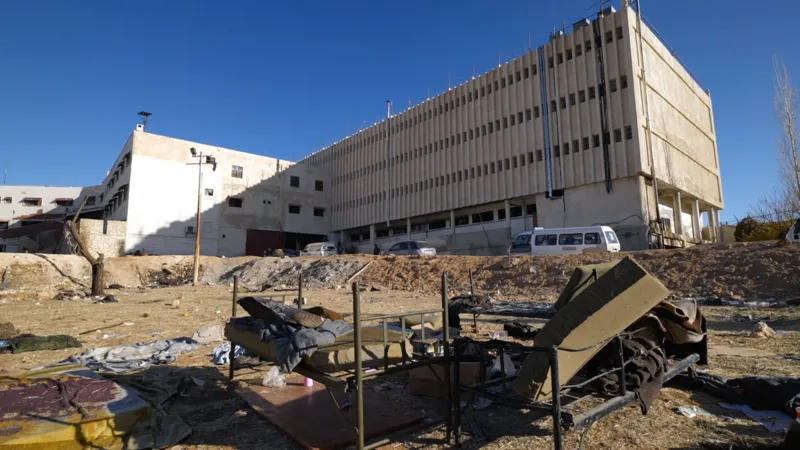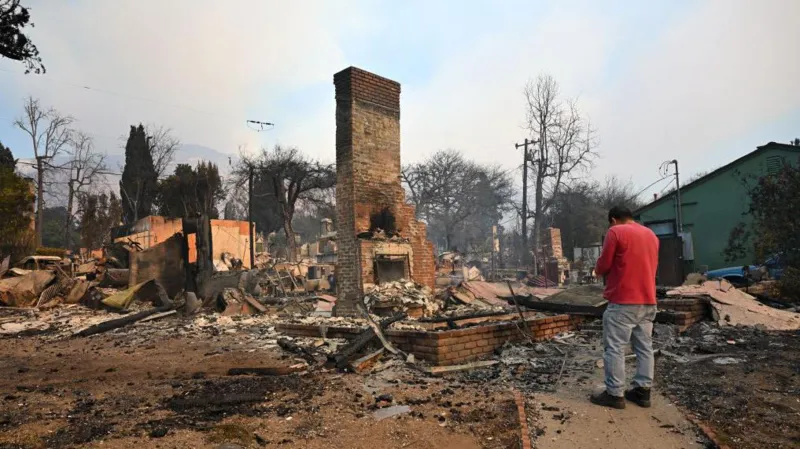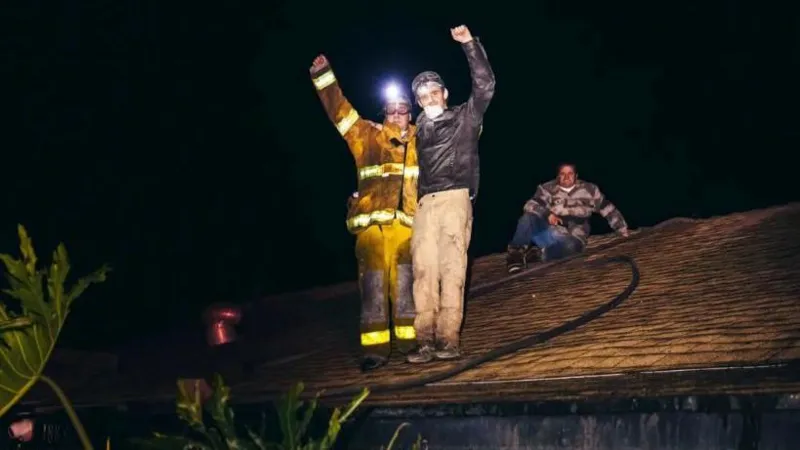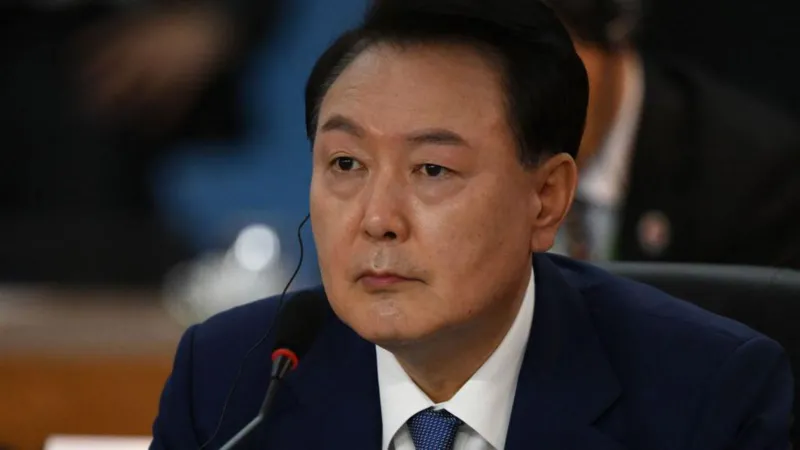International
Jeremy Bowen: Assad’s torture prison is worst I have seen

Saydnaya prison sits on a forbidding hill about half an hour’s drive from the centre of Damascus.
In the last few days the entrance has been repainted in the green, white and black of Syria’s revolutionary flag. The new colours did not dispel the sinister atmosphere of the place.
As I walked through the gates, I thought of the despair that must have gripped the thousands of Syrians who made the same journey.
One estimate is that more than 30,000 detainees were killed in Saydnaya in the years since the start of the Syrian war in 2011. That is a large proportion of the more than 100,000 people, almost all men but including thousands of women – as well as children – who disappeared without trace into Bashar al-Assad’s gulag.
Other parts of Assad’s prison system were less cruel. Phone calls home were allowed, and families were allowed to visit.
But Saydnaya was the dark and rotten heart of the regime. Fear of being consigned there and killed without anyone knowing what had happened was a central part of the Assad regime’s system of coercion and repression.
The authorities did not have to tell families who had been incarcerated there. Allowing them to fear the worst was another way of applying pressure. The regime kept its boot on the throat of Syrians because of the power, reach and savagery of its myriad and overlapping intelligence agencies, and because of the routine use of torture and execution.
I was in other infamous prisons in the days after they were liberated, including Abu Salim, the former Libyan leader Colonel Gaddafi’s notorious jail in Tripoli and Pul-e-Charki outside Kabul in Afghanistan.
Neither were as foul and pestilent as Saydnaya. In its overcrowded cells men had to urinate into plastic bags as their access to latrines was limited.
When the locks were smashed open, they left behind their filthy rags and scraps of blankets which were all they had to cover themselves as they slept on the floor. Torture and execution have already been documented in Saydnaya.
In the months to come it is certain that more information about the horrors perpetrated inside its walls will emerge from former inmates.
In Saydnaya’s corridors you can see how hard it will be to mend the country Assad broke to try to save his regime. Now that the prison has been broken open, like the country, it has become a microcosm of all the challenges Syria faces since the Assad regime crumpled and was swept away.
The record
One challenge is making a record of exactly what the regime did to its victims. In a sign of how far Syria has come in just a week, volunteers went to the prison to try to preserve Saydnaya’s records.
Paperwork is scattered around offices and even on the concrete floor of the prison yard. Families pick up files and sheets of tattered documentation, trying to find a name, a date or a place that they recognise.
The disarray of the records looks as if someone tried to destroy what was done here in the name of Bashar al-Assad’s Syria. When dictators and their henchmen fall, making sure they don’t take the truth with them is a big part of a better future.
International
LA fire victims fear new housing crisis

Michael Storc and his family had just survived a devastating wildfire.
Now they have to face a daunting new challenge that he had hoped to never experience again – the Los Angeles housing market.
After losing the Altadena home that he owned in the Eaton fire, he was scouring for a new place to rent, and having little luck.
“What’s available is not nice at all and the rents have gone up a lot,” Mr Storc told the BBC. “I told my teenage daughter we had to accept we would live somewhere not very nice.”
The Los Angeles area already has one of the most expensive real estate markets in the country. And with thousands now displaced by the Palisades and Eaton fires, Angelenos are anxious that the sudden surge in demand could make rents and home prices soar even higher.
California has an anti-price gouging law that prevents landlords from raising rents more than 10% after the governor declares an emergency. It applies to both existing and tenants and new leases.
Follow live updates
LA brain surgeon saves street from fires
Many Los Angeles County buildings are also covered by rent stabilisation laws, which prevent landlords from raising the rent for existing tenants above a certain percentage even in normal circumstances.
“It is illegal. You cannot do it,” California attorney general Rob Bonta said at a Saturday press conference. “It is a crime punishable by up to a year in jail and fines.”
Not everyone was certain that the law would be completely enforceable, however.
“We’re aware of that but my question is, how is that being regulated? And who’s monitoring that?” said Jessica Heredia, a realtor based in the high-end Brentwood neighbourhood for the last 20 years.
International
LA brain surgeon saves street from ‘apocalyptic’ wildfires

A Los Angeles brain surgeon who fought for almost a week to save the houses on his street from wildfires told the BBC he spent 15 years preparing for such an event.
Malibu resident Dr Chester Griffiths, 62, ignored evacuation orders to keep flames from the Palisades fire at bay with the help of his son and neighbour, until emergency services were able to reach them.
“We had always known that a fire would come someday – but we didn’t know when,” Dr Griffiths told the BBC’s Today Programme.
“We never fathomed it would be this catastrophic and apocalyptic.”
International
S Korea begins impeachment trial of suspended president

South Korea’s Constitutional Court has held its first hearing to decide if suspended President Yoon Suk Yeol should be removed from office after his shock martial law attempt last month.
The hearing ended within four minutes because of Yoon’s absence – his lawyers had earlier said he would not attend for his own safety, as there is a warrant out for his arrest on separate charges of insurrection.
In December, Yoon was suspended after members of his own party voted with the opposition to impeach him.
However he will only be formally removed from office if at least six of the eight-member Constitutional Court bench votes to uphold the impeachment.
According to South Korean law, the court must set a new date for a hearing before they can proceed without his participation.
The next hearing is scheduled for Thursday.
Yoon’s lawyers have indicated that he will show up for a hearing at an “appropriate time”, but they have challenged the court’s “unilateral decision” on trial dates.
The court on Tuesday rejected the lawyers’ request for one of the eight justices to be recused from the proceedings.
Yoon has not commented publicly since parliament voted to impeach him on 14 December and has been speaking primarily through his lawyers.
Investigators are also separately preparing for another attempt to arrest Yoon for alleged insurrection, after an earlier attempt on 3 January ended following an hours-long standoff with his security team.
Yoon is South Korea’s first sitting president to face arrest. The second attempt to take him into custody could happen as early as this week, according to local media.
The suspended leader has not commented publicly since parliament voted to impeach him on 14 December and has been speaking primarily through his lawyers.
Yoon’s short-lived martial law declaration on 3 December has thrown South Korea into political turmoil. He had tried to justify the attempt by saying he was protecting the country from “anti-state” forces, but it soon became clear it was spurred by his own political troubles.
What followed was an unprecedented few weeks which saw the opposition-dominated parliament vote to impeach Yoon and then Prime Minister Han Duck-soo, who succeeded him briefly as acting president.
The crisis has hit the country’s economy, with the won weakening and global credit rating agencies warning of weakening consumer and business sentiment.
Former presidents Roh Moo-hyun and Park Geun-hye did not attend their impeachment trials in 2004 and 2017 respectively.
In Park’s case, the first hearing ended after nine minutes in her absence.
Roh was reinstated after a two-month review, while Park’s impeachment was upheld.
-

 Entertainment6 months ago
Entertainment6 months agoEarthquake scientists are learning warning signs of ‘The Big One.’ When should they tell the public?
-

 International6 months ago
International6 months agoTarar accuses Imran Khan of conspiring with Faiz Hameed to destabilise Pakistan
-

 International4 months ago
International4 months agoPTI Announces Not to Boycott New Committees
-

 Business4 months ago
Business4 months agoMajor Corruption Scandal Uncovered at WASA Multan: Rs1.5 Billion Embezzlement Exposed
-

 Business6 months ago
Business6 months agoThe Impact of QR Codes on Traditional Advertising
-

 Business3 months ago
Business3 months agoHigh Court Blocks MDCAT Merit List Amid Controversy Over Exam Error
-

 Business6 months ago
Business6 months agoThe Benefits and Problems of International Trade in the Context of Global Crisis
-

 Business5 months ago
Business5 months agoFraud by Pakistani Firm Sparks Outrage in Business Community; Concerns Rise Over International Investment






